Refugee Youth Health and Empowerment Factors
VerifiedAdded on 2020/10/22
|12
|4032
|156
AI Summary
The assignment explores socio-cultural factors that affect the health and empowerment of refugee youth. It involves analyzing various studies and papers on refugee youth health, including community gardens for refugee communities, building social capital through peer-led workshops, mental health literacy among refugee communities, and long-term refugee health. The assignment aims to understand how different socio-cultural factors impact the well-being of refugee youth.
Contribute Materials
Your contribution can guide someone’s learning journey. Share your
documents today.
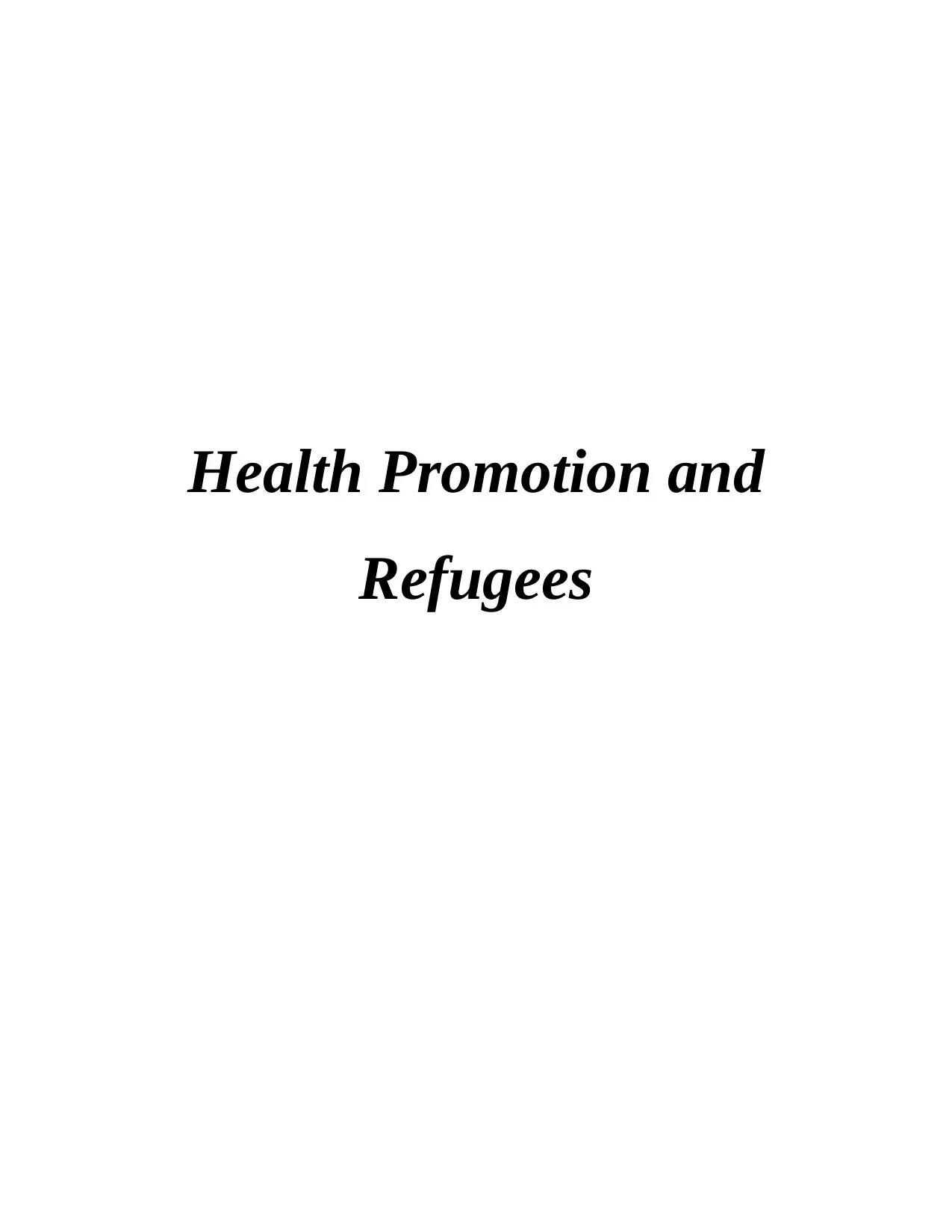
Health Promotion and
Refugees
Refugees
Secure Best Marks with AI Grader
Need help grading? Try our AI Grader for instant feedback on your assignments.
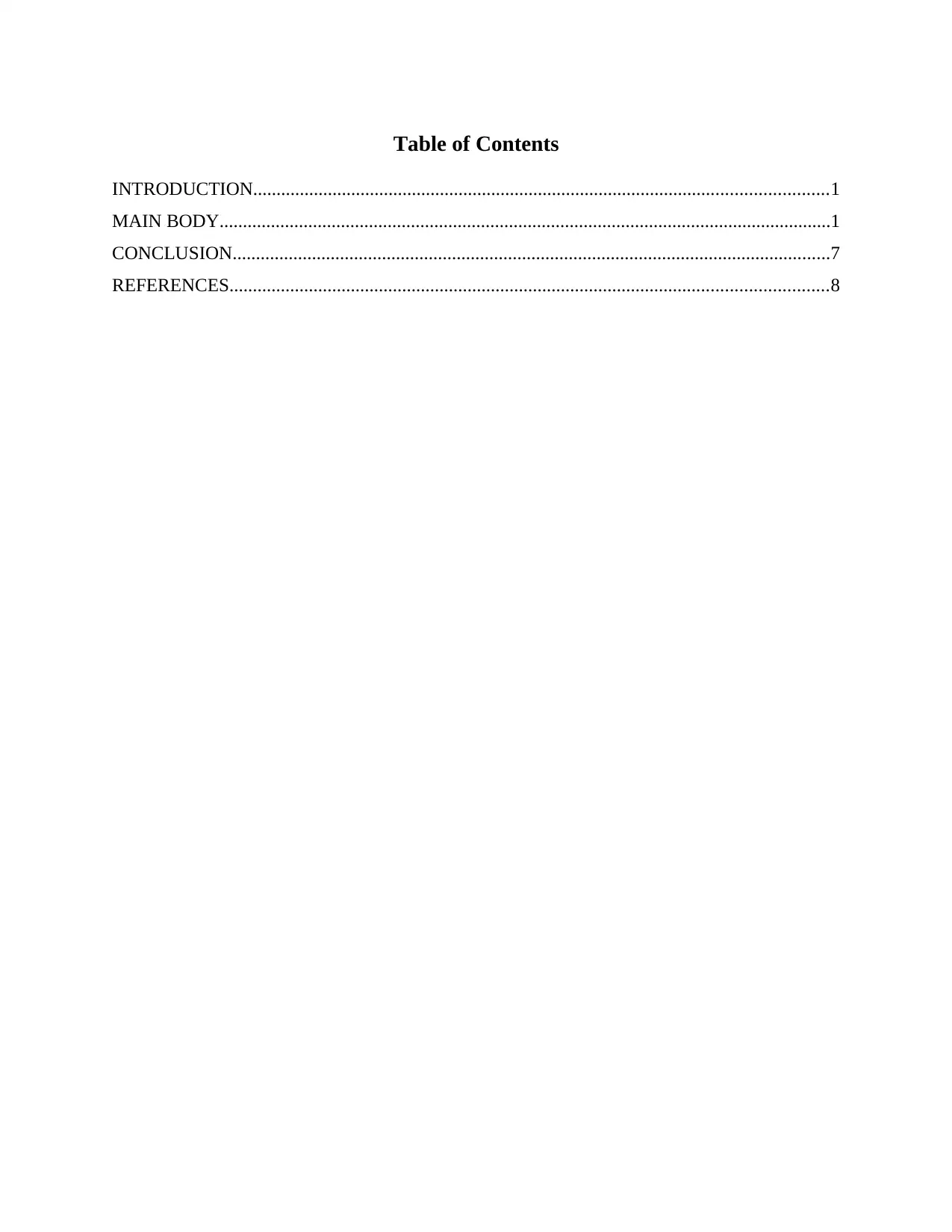
Table of Contents
INTRODUCTION...........................................................................................................................1
MAIN BODY...................................................................................................................................1
CONCLUSION................................................................................................................................7
REFERENCES................................................................................................................................8
INTRODUCTION...........................................................................................................................1
MAIN BODY...................................................................................................................................1
CONCLUSION................................................................................................................................7
REFERENCES................................................................................................................................8
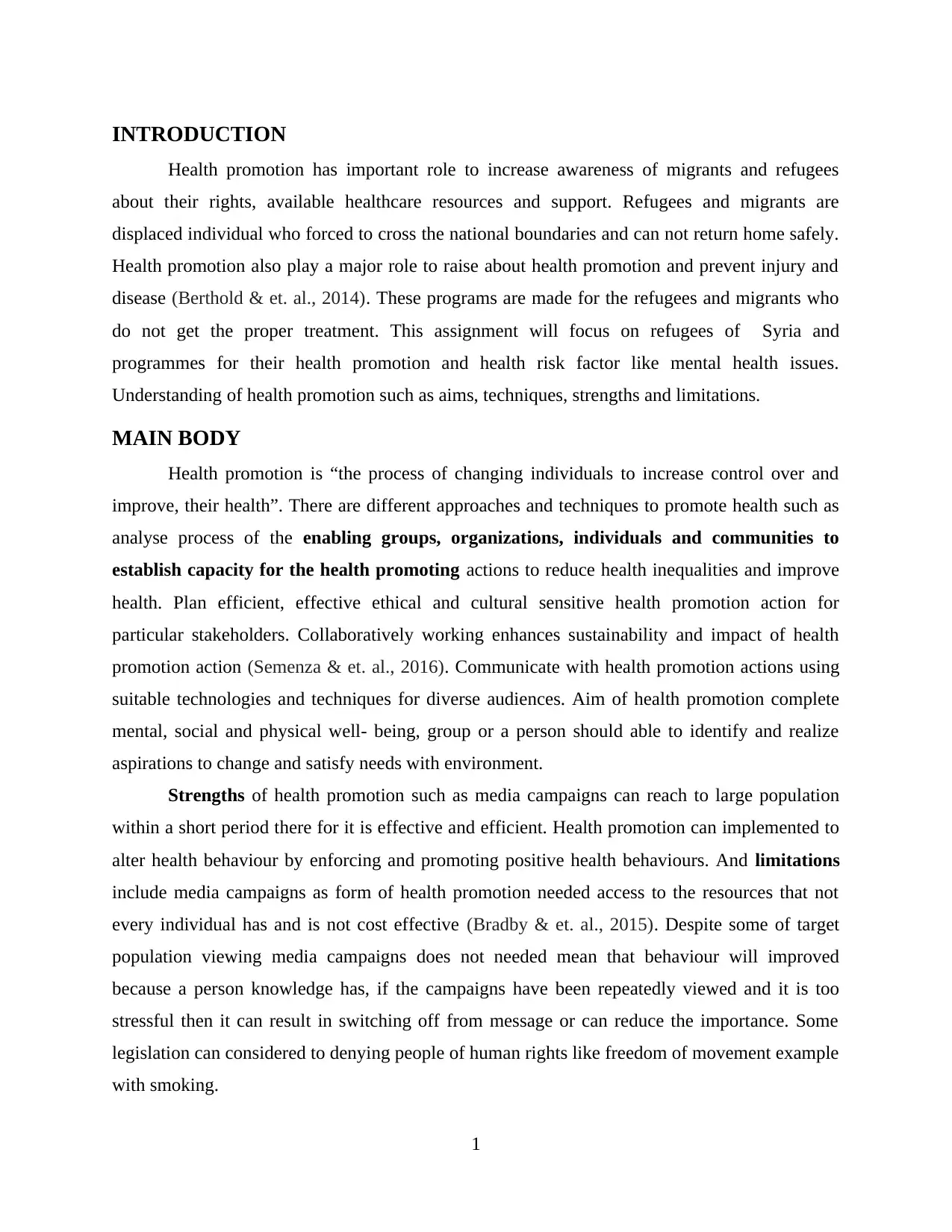
INTRODUCTION
Health promotion has important role to increase awareness of migrants and refugees
about their rights, available healthcare resources and support. Refugees and migrants are
displaced individual who forced to cross the national boundaries and can not return home safely.
Health promotion also play a major role to raise about health promotion and prevent injury and
disease (Berthold & et. al., 2014). These programs are made for the refugees and migrants who
do not get the proper treatment. This assignment will focus on refugees of Syria and
programmes for their health promotion and health risk factor like mental health issues.
Understanding of health promotion such as aims, techniques, strengths and limitations.
MAIN BODY
Health promotion is “the process of changing individuals to increase control over and
improve, their health”. There are different approaches and techniques to promote health such as
analyse process of the enabling groups, organizations, individuals and communities to
establish capacity for the health promoting actions to reduce health inequalities and improve
health. Plan efficient, effective ethical and cultural sensitive health promotion action for
particular stakeholders. Collaboratively working enhances sustainability and impact of health
promotion action (Semenza & et. al., 2016). Communicate with health promotion actions using
suitable technologies and techniques for diverse audiences. Aim of health promotion complete
mental, social and physical well- being, group or a person should able to identify and realize
aspirations to change and satisfy needs with environment.
Strengths of health promotion such as media campaigns can reach to large population
within a short period there for it is effective and efficient. Health promotion can implemented to
alter health behaviour by enforcing and promoting positive health behaviours. And limitations
include media campaigns as form of health promotion needed access to the resources that not
every individual has and is not cost effective (Bradby & et. al., 2015). Despite some of target
population viewing media campaigns does not needed mean that behaviour will improved
because a person knowledge has, if the campaigns have been repeatedly viewed and it is too
stressful then it can result in switching off from message or can reduce the importance. Some
legislation can considered to denying people of human rights like freedom of movement example
with smoking.
1
Health promotion has important role to increase awareness of migrants and refugees
about their rights, available healthcare resources and support. Refugees and migrants are
displaced individual who forced to cross the national boundaries and can not return home safely.
Health promotion also play a major role to raise about health promotion and prevent injury and
disease (Berthold & et. al., 2014). These programs are made for the refugees and migrants who
do not get the proper treatment. This assignment will focus on refugees of Syria and
programmes for their health promotion and health risk factor like mental health issues.
Understanding of health promotion such as aims, techniques, strengths and limitations.
MAIN BODY
Health promotion is “the process of changing individuals to increase control over and
improve, their health”. There are different approaches and techniques to promote health such as
analyse process of the enabling groups, organizations, individuals and communities to
establish capacity for the health promoting actions to reduce health inequalities and improve
health. Plan efficient, effective ethical and cultural sensitive health promotion action for
particular stakeholders. Collaboratively working enhances sustainability and impact of health
promotion action (Semenza & et. al., 2016). Communicate with health promotion actions using
suitable technologies and techniques for diverse audiences. Aim of health promotion complete
mental, social and physical well- being, group or a person should able to identify and realize
aspirations to change and satisfy needs with environment.
Strengths of health promotion such as media campaigns can reach to large population
within a short period there for it is effective and efficient. Health promotion can implemented to
alter health behaviour by enforcing and promoting positive health behaviours. And limitations
include media campaigns as form of health promotion needed access to the resources that not
every individual has and is not cost effective (Bradby & et. al., 2015). Despite some of target
population viewing media campaigns does not needed mean that behaviour will improved
because a person knowledge has, if the campaigns have been repeatedly viewed and it is too
stressful then it can result in switching off from message or can reduce the importance. Some
legislation can considered to denying people of human rights like freedom of movement example
with smoking.
1
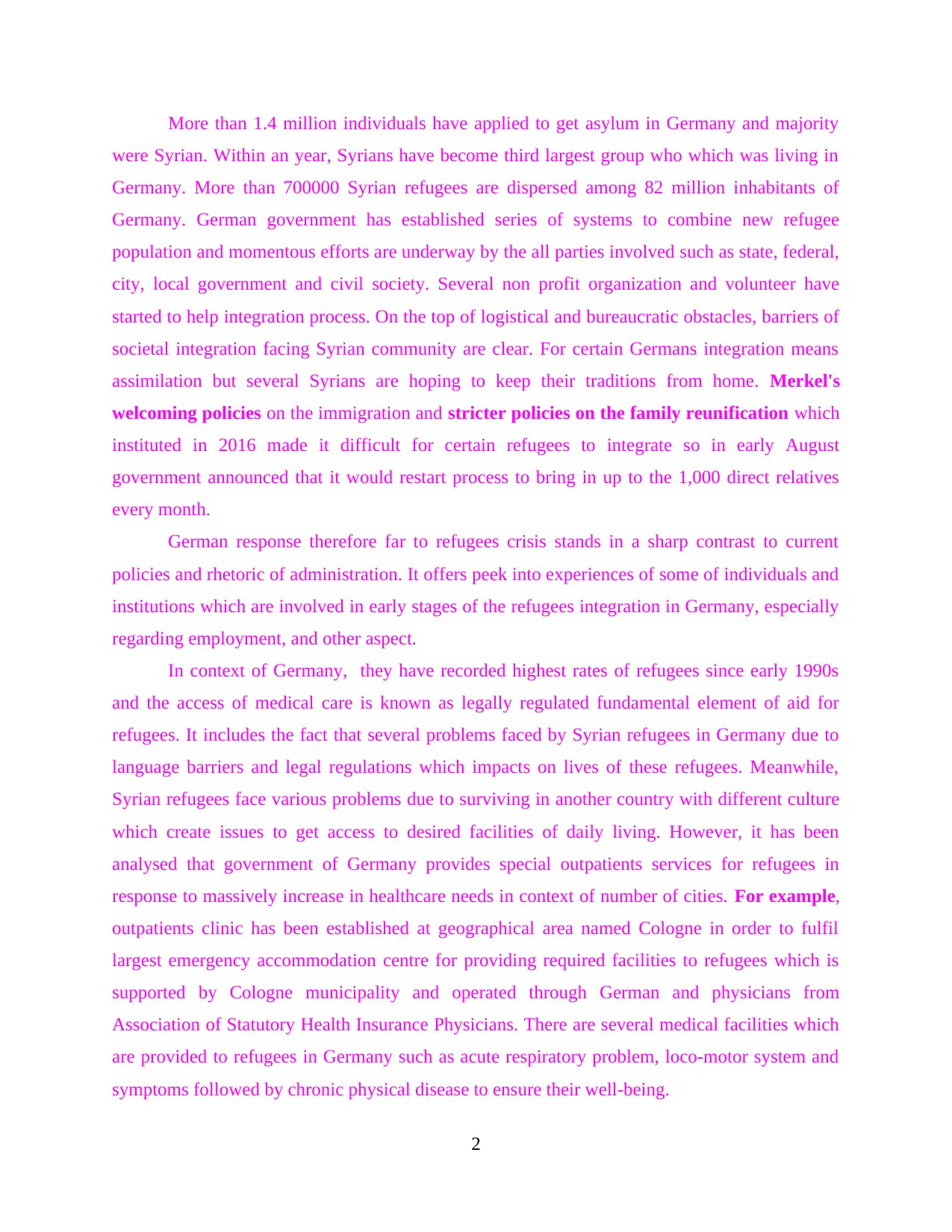
More than 1.4 million individuals have applied to get asylum in Germany and majority
were Syrian. Within an year, Syrians have become third largest group who which was living in
Germany. More than 700000 Syrian refugees are dispersed among 82 million inhabitants of
Germany. German government has established series of systems to combine new refugee
population and momentous efforts are underway by the all parties involved such as state, federal,
city, local government and civil society. Several non profit organization and volunteer have
started to help integration process. On the top of logistical and bureaucratic obstacles, barriers of
societal integration facing Syrian community are clear. For certain Germans integration means
assimilation but several Syrians are hoping to keep their traditions from home. Merkel's
welcoming policies on the immigration and stricter policies on the family reunification which
instituted in 2016 made it difficult for certain refugees to integrate so in early August
government announced that it would restart process to bring in up to the 1,000 direct relatives
every month.
German response therefore far to refugees crisis stands in a sharp contrast to current
policies and rhetoric of administration. It offers peek into experiences of some of individuals and
institutions which are involved in early stages of the refugees integration in Germany, especially
regarding employment, and other aspect.
In context of Germany, they have recorded highest rates of refugees since early 1990s
and the access of medical care is known as legally regulated fundamental element of aid for
refugees. It includes the fact that several problems faced by Syrian refugees in Germany due to
language barriers and legal regulations which impacts on lives of these refugees. Meanwhile,
Syrian refugees face various problems due to surviving in another country with different culture
which create issues to get access to desired facilities of daily living. However, it has been
analysed that government of Germany provides special outpatients services for refugees in
response to massively increase in healthcare needs in context of number of cities. For example,
outpatients clinic has been established at geographical area named Cologne in order to fulfil
largest emergency accommodation centre for providing required facilities to refugees which is
supported by Cologne municipality and operated through German and physicians from
Association of Statutory Health Insurance Physicians. There are several medical facilities which
are provided to refugees in Germany such as acute respiratory problem, loco-motor system and
symptoms followed by chronic physical disease to ensure their well-being.
2
were Syrian. Within an year, Syrians have become third largest group who which was living in
Germany. More than 700000 Syrian refugees are dispersed among 82 million inhabitants of
Germany. German government has established series of systems to combine new refugee
population and momentous efforts are underway by the all parties involved such as state, federal,
city, local government and civil society. Several non profit organization and volunteer have
started to help integration process. On the top of logistical and bureaucratic obstacles, barriers of
societal integration facing Syrian community are clear. For certain Germans integration means
assimilation but several Syrians are hoping to keep their traditions from home. Merkel's
welcoming policies on the immigration and stricter policies on the family reunification which
instituted in 2016 made it difficult for certain refugees to integrate so in early August
government announced that it would restart process to bring in up to the 1,000 direct relatives
every month.
German response therefore far to refugees crisis stands in a sharp contrast to current
policies and rhetoric of administration. It offers peek into experiences of some of individuals and
institutions which are involved in early stages of the refugees integration in Germany, especially
regarding employment, and other aspect.
In context of Germany, they have recorded highest rates of refugees since early 1990s
and the access of medical care is known as legally regulated fundamental element of aid for
refugees. It includes the fact that several problems faced by Syrian refugees in Germany due to
language barriers and legal regulations which impacts on lives of these refugees. Meanwhile,
Syrian refugees face various problems due to surviving in another country with different culture
which create issues to get access to desired facilities of daily living. However, it has been
analysed that government of Germany provides special outpatients services for refugees in
response to massively increase in healthcare needs in context of number of cities. For example,
outpatients clinic has been established at geographical area named Cologne in order to fulfil
largest emergency accommodation centre for providing required facilities to refugees which is
supported by Cologne municipality and operated through German and physicians from
Association of Statutory Health Insurance Physicians. There are several medical facilities which
are provided to refugees in Germany such as acute respiratory problem, loco-motor system and
symptoms followed by chronic physical disease to ensure their well-being.
2
Secure Best Marks with AI Grader
Need help grading? Try our AI Grader for instant feedback on your assignments.
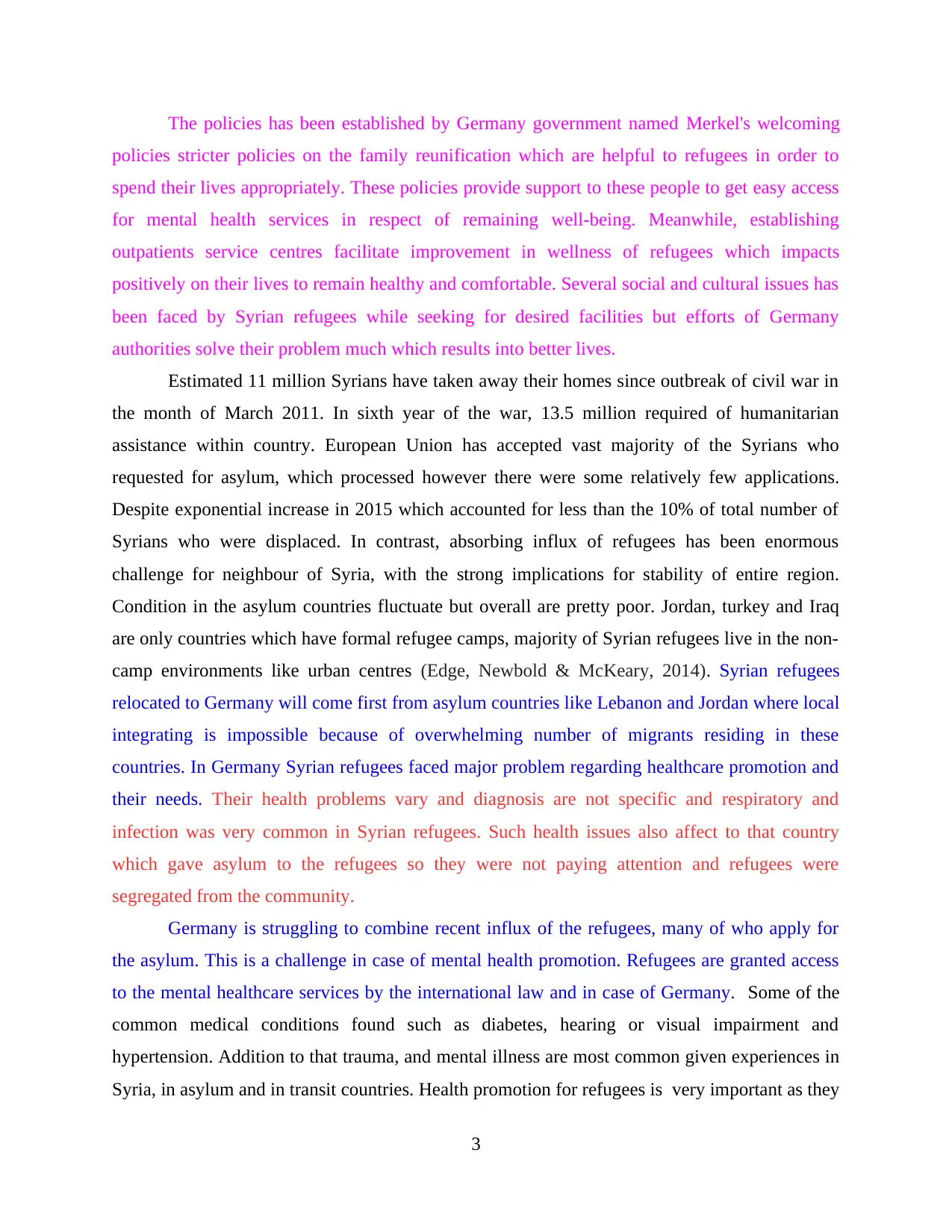
The policies has been established by Germany government named Merkel's welcoming
policies stricter policies on the family reunification which are helpful to refugees in order to
spend their lives appropriately. These policies provide support to these people to get easy access
for mental health services in respect of remaining well-being. Meanwhile, establishing
outpatients service centres facilitate improvement in wellness of refugees which impacts
positively on their lives to remain healthy and comfortable. Several social and cultural issues has
been faced by Syrian refugees while seeking for desired facilities but efforts of Germany
authorities solve their problem much which results into better lives.
Estimated 11 million Syrians have taken away their homes since outbreak of civil war in
the month of March 2011. In sixth year of the war, 13.5 million required of humanitarian
assistance within country. European Union has accepted vast majority of the Syrians who
requested for asylum, which processed however there were some relatively few applications.
Despite exponential increase in 2015 which accounted for less than the 10% of total number of
Syrians who were displaced. In contrast, absorbing influx of refugees has been enormous
challenge for neighbour of Syria, with the strong implications for stability of entire region.
Condition in the asylum countries fluctuate but overall are pretty poor. Jordan, turkey and Iraq
are only countries which have formal refugee camps, majority of Syrian refugees live in the non-
camp environments like urban centres (Edge, Newbold & McKeary, 2014). Syrian refugees
relocated to Germany will come first from asylum countries like Lebanon and Jordan where local
integrating is impossible because of overwhelming number of migrants residing in these
countries. In Germany Syrian refugees faced major problem regarding healthcare promotion and
their needs. Their health problems vary and diagnosis are not specific and respiratory and
infection was very common in Syrian refugees. Such health issues also affect to that country
which gave asylum to the refugees so they were not paying attention and refugees were
segregated from the community.
Germany is struggling to combine recent influx of the refugees, many of who apply for
the asylum. This is a challenge in case of mental health promotion. Refugees are granted access
to the mental healthcare services by the international law and in case of Germany. Some of the
common medical conditions found such as diabetes, hearing or visual impairment and
hypertension. Addition to that trauma, and mental illness are most common given experiences in
Syria, in asylum and in transit countries. Health promotion for refugees is very important as they
3
policies stricter policies on the family reunification which are helpful to refugees in order to
spend their lives appropriately. These policies provide support to these people to get easy access
for mental health services in respect of remaining well-being. Meanwhile, establishing
outpatients service centres facilitate improvement in wellness of refugees which impacts
positively on their lives to remain healthy and comfortable. Several social and cultural issues has
been faced by Syrian refugees while seeking for desired facilities but efforts of Germany
authorities solve their problem much which results into better lives.
Estimated 11 million Syrians have taken away their homes since outbreak of civil war in
the month of March 2011. In sixth year of the war, 13.5 million required of humanitarian
assistance within country. European Union has accepted vast majority of the Syrians who
requested for asylum, which processed however there were some relatively few applications.
Despite exponential increase in 2015 which accounted for less than the 10% of total number of
Syrians who were displaced. In contrast, absorbing influx of refugees has been enormous
challenge for neighbour of Syria, with the strong implications for stability of entire region.
Condition in the asylum countries fluctuate but overall are pretty poor. Jordan, turkey and Iraq
are only countries which have formal refugee camps, majority of Syrian refugees live in the non-
camp environments like urban centres (Edge, Newbold & McKeary, 2014). Syrian refugees
relocated to Germany will come first from asylum countries like Lebanon and Jordan where local
integrating is impossible because of overwhelming number of migrants residing in these
countries. In Germany Syrian refugees faced major problem regarding healthcare promotion and
their needs. Their health problems vary and diagnosis are not specific and respiratory and
infection was very common in Syrian refugees. Such health issues also affect to that country
which gave asylum to the refugees so they were not paying attention and refugees were
segregated from the community.
Germany is struggling to combine recent influx of the refugees, many of who apply for
the asylum. This is a challenge in case of mental health promotion. Refugees are granted access
to the mental healthcare services by the international law and in case of Germany. Some of the
common medical conditions found such as diabetes, hearing or visual impairment and
hypertension. Addition to that trauma, and mental illness are most common given experiences in
Syria, in asylum and in transit countries. Health promotion for refugees is very important as they
3
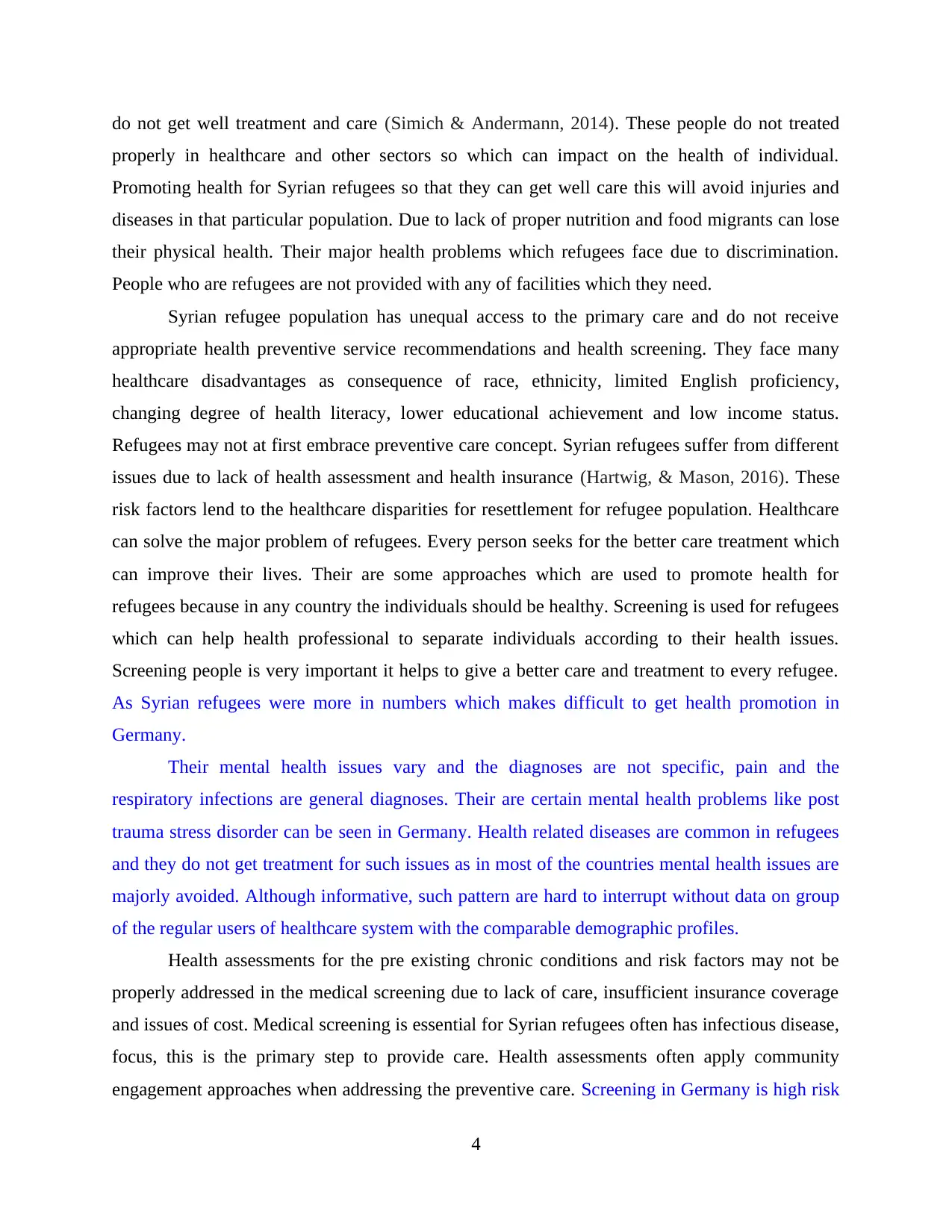
do not get well treatment and care (Simich & Andermann, 2014). These people do not treated
properly in healthcare and other sectors so which can impact on the health of individual.
Promoting health for Syrian refugees so that they can get well care this will avoid injuries and
diseases in that particular population. Due to lack of proper nutrition and food migrants can lose
their physical health. Their major health problems which refugees face due to discrimination.
People who are refugees are not provided with any of facilities which they need.
Syrian refugee population has unequal access to the primary care and do not receive
appropriate health preventive service recommendations and health screening. They face many
healthcare disadvantages as consequence of race, ethnicity, limited English proficiency,
changing degree of health literacy, lower educational achievement and low income status.
Refugees may not at first embrace preventive care concept. Syrian refugees suffer from different
issues due to lack of health assessment and health insurance (Hartwig, & Mason, 2016). These
risk factors lend to the healthcare disparities for resettlement for refugee population. Healthcare
can solve the major problem of refugees. Every person seeks for the better care treatment which
can improve their lives. Their are some approaches which are used to promote health for
refugees because in any country the individuals should be healthy. Screening is used for refugees
which can help health professional to separate individuals according to their health issues.
Screening people is very important it helps to give a better care and treatment to every refugee.
As Syrian refugees were more in numbers which makes difficult to get health promotion in
Germany.
Their mental health issues vary and the diagnoses are not specific, pain and the
respiratory infections are general diagnoses. Their are certain mental health problems like post
trauma stress disorder can be seen in Germany. Health related diseases are common in refugees
and they do not get treatment for such issues as in most of the countries mental health issues are
majorly avoided. Although informative, such pattern are hard to interrupt without data on group
of the regular users of healthcare system with the comparable demographic profiles.
Health assessments for the pre existing chronic conditions and risk factors may not be
properly addressed in the medical screening due to lack of care, insufficient insurance coverage
and issues of cost. Medical screening is essential for Syrian refugees often has infectious disease,
focus, this is the primary step to provide care. Health assessments often apply community
engagement approaches when addressing the preventive care. Screening in Germany is high risk
4
properly in healthcare and other sectors so which can impact on the health of individual.
Promoting health for Syrian refugees so that they can get well care this will avoid injuries and
diseases in that particular population. Due to lack of proper nutrition and food migrants can lose
their physical health. Their major health problems which refugees face due to discrimination.
People who are refugees are not provided with any of facilities which they need.
Syrian refugee population has unequal access to the primary care and do not receive
appropriate health preventive service recommendations and health screening. They face many
healthcare disadvantages as consequence of race, ethnicity, limited English proficiency,
changing degree of health literacy, lower educational achievement and low income status.
Refugees may not at first embrace preventive care concept. Syrian refugees suffer from different
issues due to lack of health assessment and health insurance (Hartwig, & Mason, 2016). These
risk factors lend to the healthcare disparities for resettlement for refugee population. Healthcare
can solve the major problem of refugees. Every person seeks for the better care treatment which
can improve their lives. Their are some approaches which are used to promote health for
refugees because in any country the individuals should be healthy. Screening is used for refugees
which can help health professional to separate individuals according to their health issues.
Screening people is very important it helps to give a better care and treatment to every refugee.
As Syrian refugees were more in numbers which makes difficult to get health promotion in
Germany.
Their mental health issues vary and the diagnoses are not specific, pain and the
respiratory infections are general diagnoses. Their are certain mental health problems like post
trauma stress disorder can be seen in Germany. Health related diseases are common in refugees
and they do not get treatment for such issues as in most of the countries mental health issues are
majorly avoided. Although informative, such pattern are hard to interrupt without data on group
of the regular users of healthcare system with the comparable demographic profiles.
Health assessments for the pre existing chronic conditions and risk factors may not be
properly addressed in the medical screening due to lack of care, insufficient insurance coverage
and issues of cost. Medical screening is essential for Syrian refugees often has infectious disease,
focus, this is the primary step to provide care. Health assessments often apply community
engagement approaches when addressing the preventive care. Screening in Germany is high risk
4
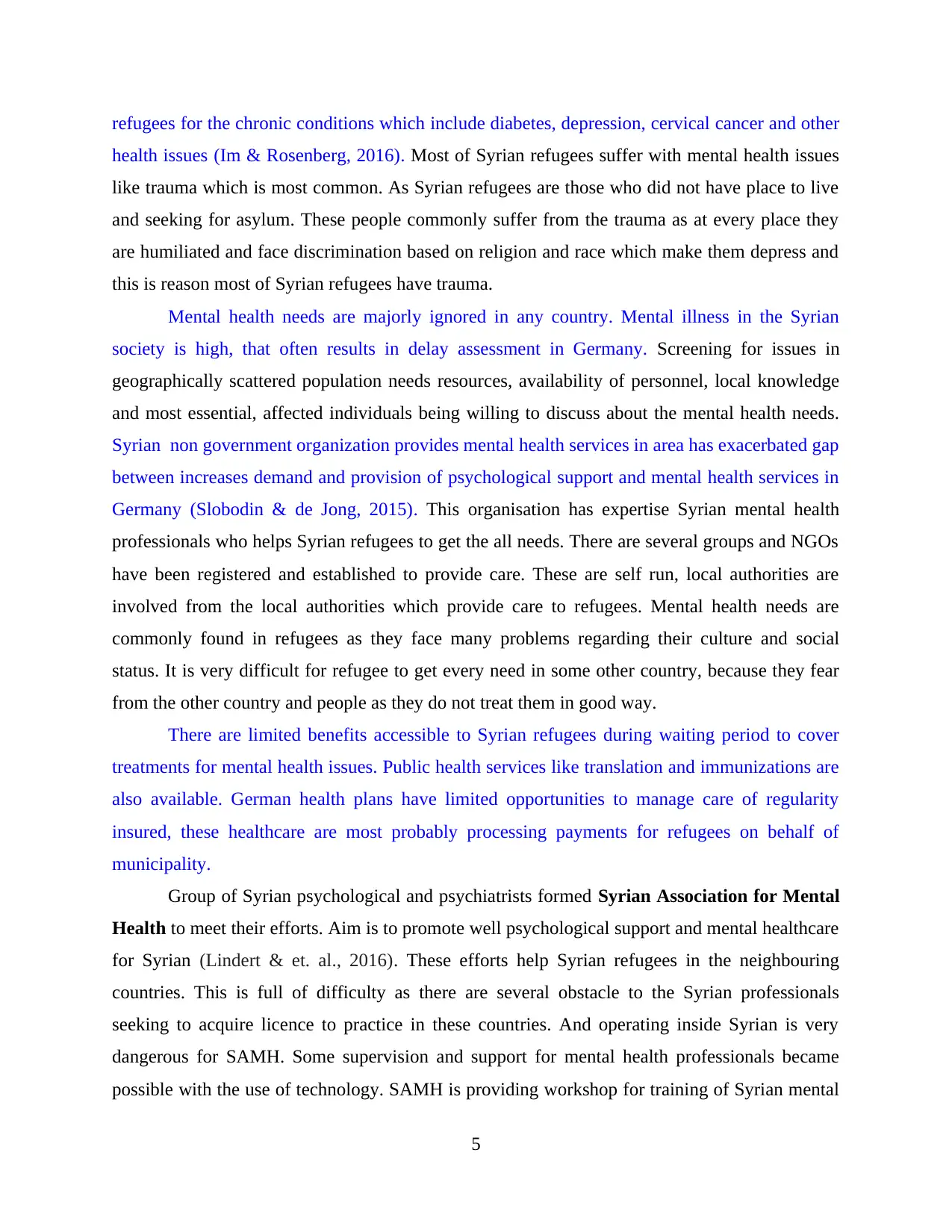
refugees for the chronic conditions which include diabetes, depression, cervical cancer and other
health issues (Im & Rosenberg, 2016). Most of Syrian refugees suffer with mental health issues
like trauma which is most common. As Syrian refugees are those who did not have place to live
and seeking for asylum. These people commonly suffer from the trauma as at every place they
are humiliated and face discrimination based on religion and race which make them depress and
this is reason most of Syrian refugees have trauma.
Mental health needs are majorly ignored in any country. Mental illness in the Syrian
society is high, that often results in delay assessment in Germany. Screening for issues in
geographically scattered population needs resources, availability of personnel, local knowledge
and most essential, affected individuals being willing to discuss about the mental health needs.
Syrian non government organization provides mental health services in area has exacerbated gap
between increases demand and provision of psychological support and mental health services in
Germany (Slobodin & de Jong, 2015). This organisation has expertise Syrian mental health
professionals who helps Syrian refugees to get the all needs. There are several groups and NGOs
have been registered and established to provide care. These are self run, local authorities are
involved from the local authorities which provide care to refugees. Mental health needs are
commonly found in refugees as they face many problems regarding their culture and social
status. It is very difficult for refugee to get every need in some other country, because they fear
from the other country and people as they do not treat them in good way.
There are limited benefits accessible to Syrian refugees during waiting period to cover
treatments for mental health issues. Public health services like translation and immunizations are
also available. German health plans have limited opportunities to manage care of regularity
insured, these healthcare are most probably processing payments for refugees on behalf of
municipality.
Group of Syrian psychological and psychiatrists formed Syrian Association for Mental
Health to meet their efforts. Aim is to promote well psychological support and mental healthcare
for Syrian (Lindert & et. al., 2016). These efforts help Syrian refugees in the neighbouring
countries. This is full of difficulty as there are several obstacle to the Syrian professionals
seeking to acquire licence to practice in these countries. And operating inside Syrian is very
dangerous for SAMH. Some supervision and support for mental health professionals became
possible with the use of technology. SAMH is providing workshop for training of Syrian mental
5
health issues (Im & Rosenberg, 2016). Most of Syrian refugees suffer with mental health issues
like trauma which is most common. As Syrian refugees are those who did not have place to live
and seeking for asylum. These people commonly suffer from the trauma as at every place they
are humiliated and face discrimination based on religion and race which make them depress and
this is reason most of Syrian refugees have trauma.
Mental health needs are majorly ignored in any country. Mental illness in the Syrian
society is high, that often results in delay assessment in Germany. Screening for issues in
geographically scattered population needs resources, availability of personnel, local knowledge
and most essential, affected individuals being willing to discuss about the mental health needs.
Syrian non government organization provides mental health services in area has exacerbated gap
between increases demand and provision of psychological support and mental health services in
Germany (Slobodin & de Jong, 2015). This organisation has expertise Syrian mental health
professionals who helps Syrian refugees to get the all needs. There are several groups and NGOs
have been registered and established to provide care. These are self run, local authorities are
involved from the local authorities which provide care to refugees. Mental health needs are
commonly found in refugees as they face many problems regarding their culture and social
status. It is very difficult for refugee to get every need in some other country, because they fear
from the other country and people as they do not treat them in good way.
There are limited benefits accessible to Syrian refugees during waiting period to cover
treatments for mental health issues. Public health services like translation and immunizations are
also available. German health plans have limited opportunities to manage care of regularity
insured, these healthcare are most probably processing payments for refugees on behalf of
municipality.
Group of Syrian psychological and psychiatrists formed Syrian Association for Mental
Health to meet their efforts. Aim is to promote well psychological support and mental healthcare
for Syrian (Lindert & et. al., 2016). These efforts help Syrian refugees in the neighbouring
countries. This is full of difficulty as there are several obstacle to the Syrian professionals
seeking to acquire licence to practice in these countries. And operating inside Syrian is very
dangerous for SAMH. Some supervision and support for mental health professionals became
possible with the use of technology. SAMH is providing workshop for training of Syrian mental
5
Paraphrase This Document
Need a fresh take? Get an instant paraphrase of this document with our AI Paraphraser
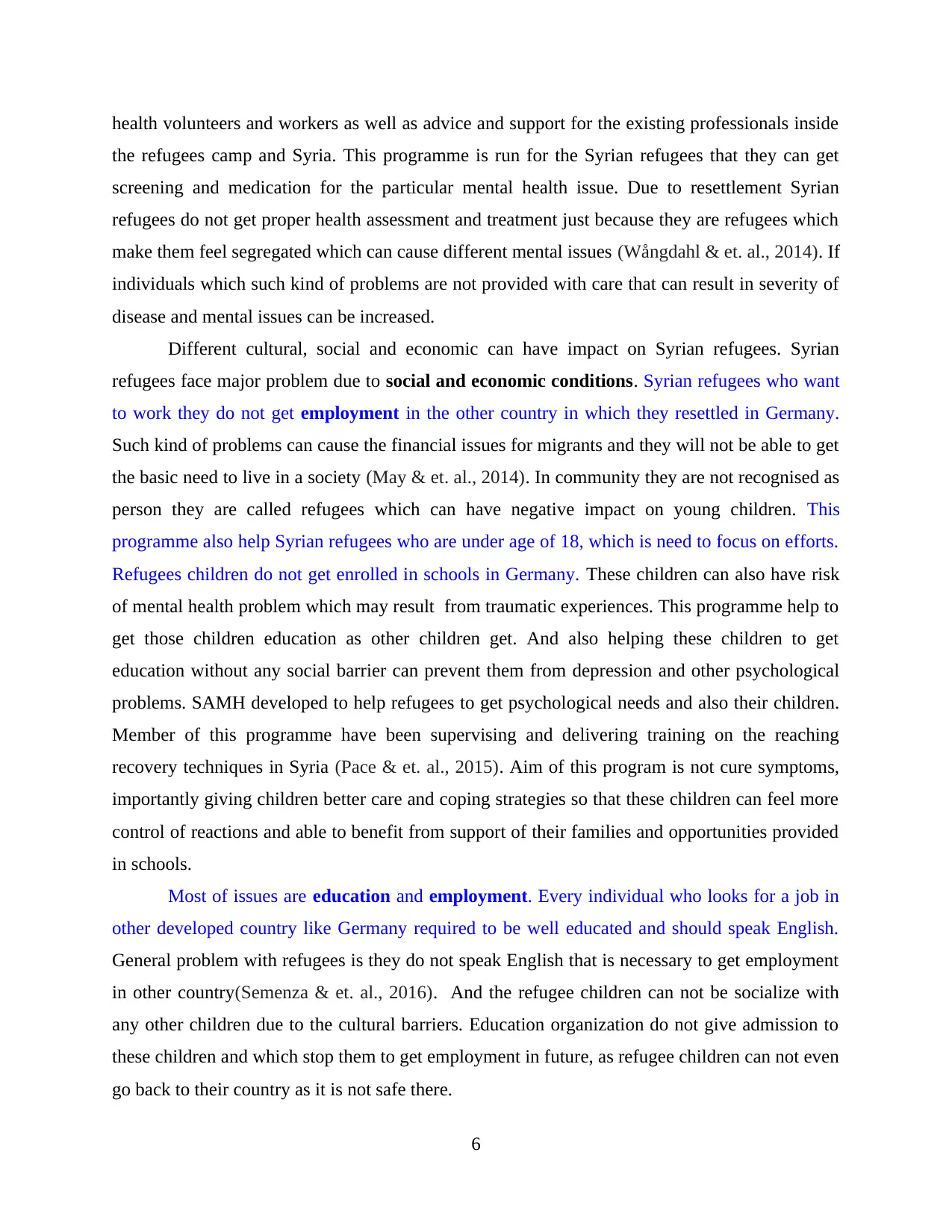
health volunteers and workers as well as advice and support for the existing professionals inside
the refugees camp and Syria. This programme is run for the Syrian refugees that they can get
screening and medication for the particular mental health issue. Due to resettlement Syrian
refugees do not get proper health assessment and treatment just because they are refugees which
make them feel segregated which can cause different mental issues (Wångdahl & et. al., 2014). If
individuals which such kind of problems are not provided with care that can result in severity of
disease and mental issues can be increased.
Different cultural, social and economic can have impact on Syrian refugees. Syrian
refugees face major problem due to social and economic conditions. Syrian refugees who want
to work they do not get employment in the other country in which they resettled in Germany.
Such kind of problems can cause the financial issues for migrants and they will not be able to get
the basic need to live in a society (May & et. al., 2014). In community they are not recognised as
person they are called refugees which can have negative impact on young children. This
programme also help Syrian refugees who are under age of 18, which is need to focus on efforts.
Refugees children do not get enrolled in schools in Germany. These children can also have risk
of mental health problem which may result from traumatic experiences. This programme help to
get those children education as other children get. And also helping these children to get
education without any social barrier can prevent them from depression and other psychological
problems. SAMH developed to help refugees to get psychological needs and also their children.
Member of this programme have been supervising and delivering training on the reaching
recovery techniques in Syria (Pace & et. al., 2015). Aim of this program is not cure symptoms,
importantly giving children better care and coping strategies so that these children can feel more
control of reactions and able to benefit from support of their families and opportunities provided
in schools.
Most of issues are education and employment. Every individual who looks for a job in
other developed country like Germany required to be well educated and should speak English.
General problem with refugees is they do not speak English that is necessary to get employment
in other country(Semenza & et. al., 2016). And the refugee children can not be socialize with
any other children due to the cultural barriers. Education organization do not give admission to
these children and which stop them to get employment in future, as refugee children can not even
go back to their country as it is not safe there.
6
the refugees camp and Syria. This programme is run for the Syrian refugees that they can get
screening and medication for the particular mental health issue. Due to resettlement Syrian
refugees do not get proper health assessment and treatment just because they are refugees which
make them feel segregated which can cause different mental issues (Wångdahl & et. al., 2014). If
individuals which such kind of problems are not provided with care that can result in severity of
disease and mental issues can be increased.
Different cultural, social and economic can have impact on Syrian refugees. Syrian
refugees face major problem due to social and economic conditions. Syrian refugees who want
to work they do not get employment in the other country in which they resettled in Germany.
Such kind of problems can cause the financial issues for migrants and they will not be able to get
the basic need to live in a society (May & et. al., 2014). In community they are not recognised as
person they are called refugees which can have negative impact on young children. This
programme also help Syrian refugees who are under age of 18, which is need to focus on efforts.
Refugees children do not get enrolled in schools in Germany. These children can also have risk
of mental health problem which may result from traumatic experiences. This programme help to
get those children education as other children get. And also helping these children to get
education without any social barrier can prevent them from depression and other psychological
problems. SAMH developed to help refugees to get psychological needs and also their children.
Member of this programme have been supervising and delivering training on the reaching
recovery techniques in Syria (Pace & et. al., 2015). Aim of this program is not cure symptoms,
importantly giving children better care and coping strategies so that these children can feel more
control of reactions and able to benefit from support of their families and opportunities provided
in schools.
Most of issues are education and employment. Every individual who looks for a job in
other developed country like Germany required to be well educated and should speak English.
General problem with refugees is they do not speak English that is necessary to get employment
in other country(Semenza & et. al., 2016). And the refugee children can not be socialize with
any other children due to the cultural barriers. Education organization do not give admission to
these children and which stop them to get employment in future, as refugee children can not even
go back to their country as it is not safe there.
6
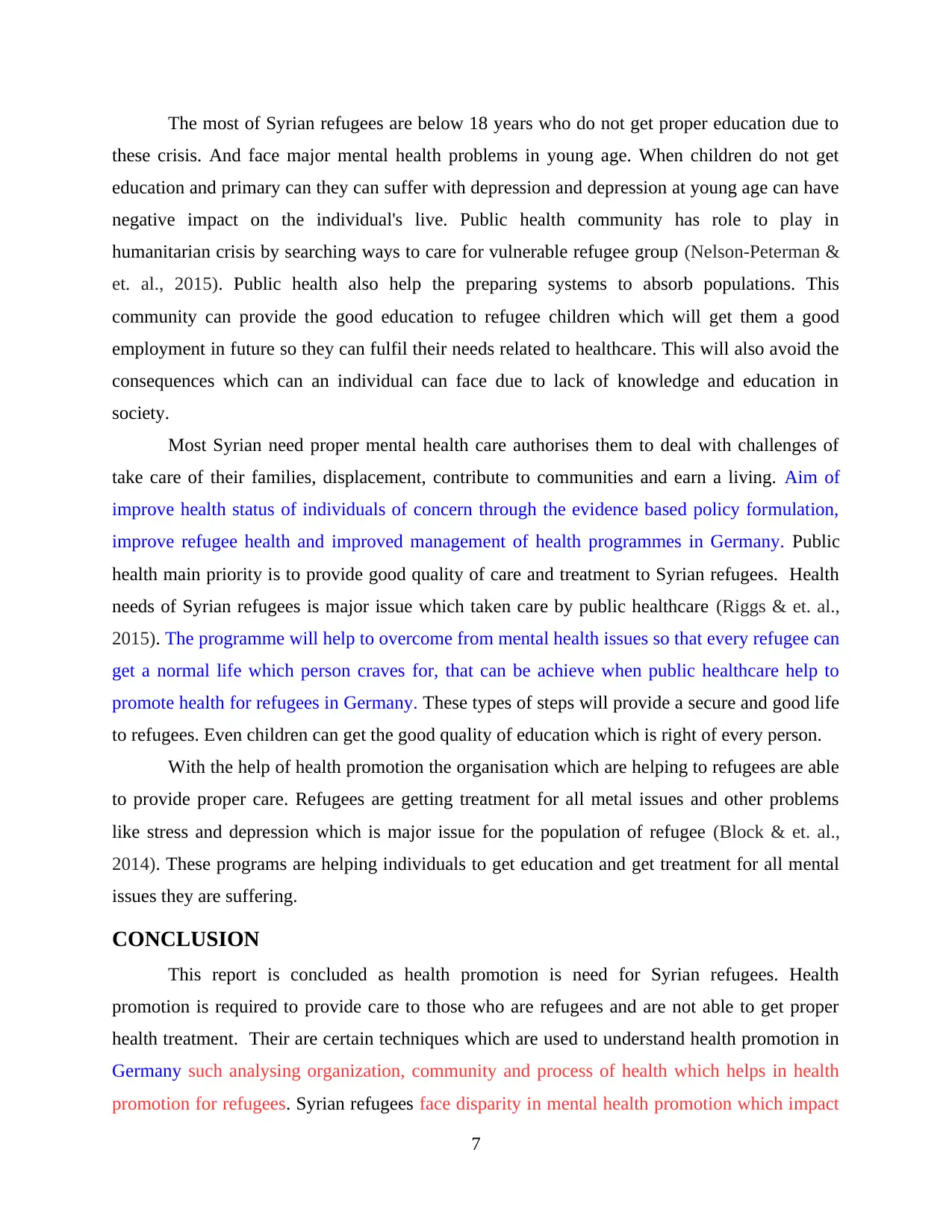
The most of Syrian refugees are below 18 years who do not get proper education due to
these crisis. And face major mental health problems in young age. When children do not get
education and primary can they can suffer with depression and depression at young age can have
negative impact on the individual's live. Public health community has role to play in
humanitarian crisis by searching ways to care for vulnerable refugee group (Nelson-Peterman &
et. al., 2015). Public health also help the preparing systems to absorb populations. This
community can provide the good education to refugee children which will get them a good
employment in future so they can fulfil their needs related to healthcare. This will also avoid the
consequences which can an individual can face due to lack of knowledge and education in
society.
Most Syrian need proper mental health care authorises them to deal with challenges of
take care of their families, displacement, contribute to communities and earn a living. Aim of
improve health status of individuals of concern through the evidence based policy formulation,
improve refugee health and improved management of health programmes in Germany. Public
health main priority is to provide good quality of care and treatment to Syrian refugees. Health
needs of Syrian refugees is major issue which taken care by public healthcare (Riggs & et. al.,
2015). The programme will help to overcome from mental health issues so that every refugee can
get a normal life which person craves for, that can be achieve when public healthcare help to
promote health for refugees in Germany. These types of steps will provide a secure and good life
to refugees. Even children can get the good quality of education which is right of every person.
With the help of health promotion the organisation which are helping to refugees are able
to provide proper care. Refugees are getting treatment for all metal issues and other problems
like stress and depression which is major issue for the population of refugee (Block & et. al.,
2014). These programs are helping individuals to get education and get treatment for all mental
issues they are suffering.
CONCLUSION
This report is concluded as health promotion is need for Syrian refugees. Health
promotion is required to provide care to those who are refugees and are not able to get proper
health treatment. Their are certain techniques which are used to understand health promotion in
Germany such analysing organization, community and process of health which helps in health
promotion for refugees. Syrian refugees face disparity in mental health promotion which impact
7
these crisis. And face major mental health problems in young age. When children do not get
education and primary can they can suffer with depression and depression at young age can have
negative impact on the individual's live. Public health community has role to play in
humanitarian crisis by searching ways to care for vulnerable refugee group (Nelson-Peterman &
et. al., 2015). Public health also help the preparing systems to absorb populations. This
community can provide the good education to refugee children which will get them a good
employment in future so they can fulfil their needs related to healthcare. This will also avoid the
consequences which can an individual can face due to lack of knowledge and education in
society.
Most Syrian need proper mental health care authorises them to deal with challenges of
take care of their families, displacement, contribute to communities and earn a living. Aim of
improve health status of individuals of concern through the evidence based policy formulation,
improve refugee health and improved management of health programmes in Germany. Public
health main priority is to provide good quality of care and treatment to Syrian refugees. Health
needs of Syrian refugees is major issue which taken care by public healthcare (Riggs & et. al.,
2015). The programme will help to overcome from mental health issues so that every refugee can
get a normal life which person craves for, that can be achieve when public healthcare help to
promote health for refugees in Germany. These types of steps will provide a secure and good life
to refugees. Even children can get the good quality of education which is right of every person.
With the help of health promotion the organisation which are helping to refugees are able
to provide proper care. Refugees are getting treatment for all metal issues and other problems
like stress and depression which is major issue for the population of refugee (Block & et. al.,
2014). These programs are helping individuals to get education and get treatment for all mental
issues they are suffering.
CONCLUSION
This report is concluded as health promotion is need for Syrian refugees. Health
promotion is required to provide care to those who are refugees and are not able to get proper
health treatment. Their are certain techniques which are used to understand health promotion in
Germany such analysing organization, community and process of health which helps in health
promotion for refugees. Syrian refugees face disparity in mental health promotion which impact
7
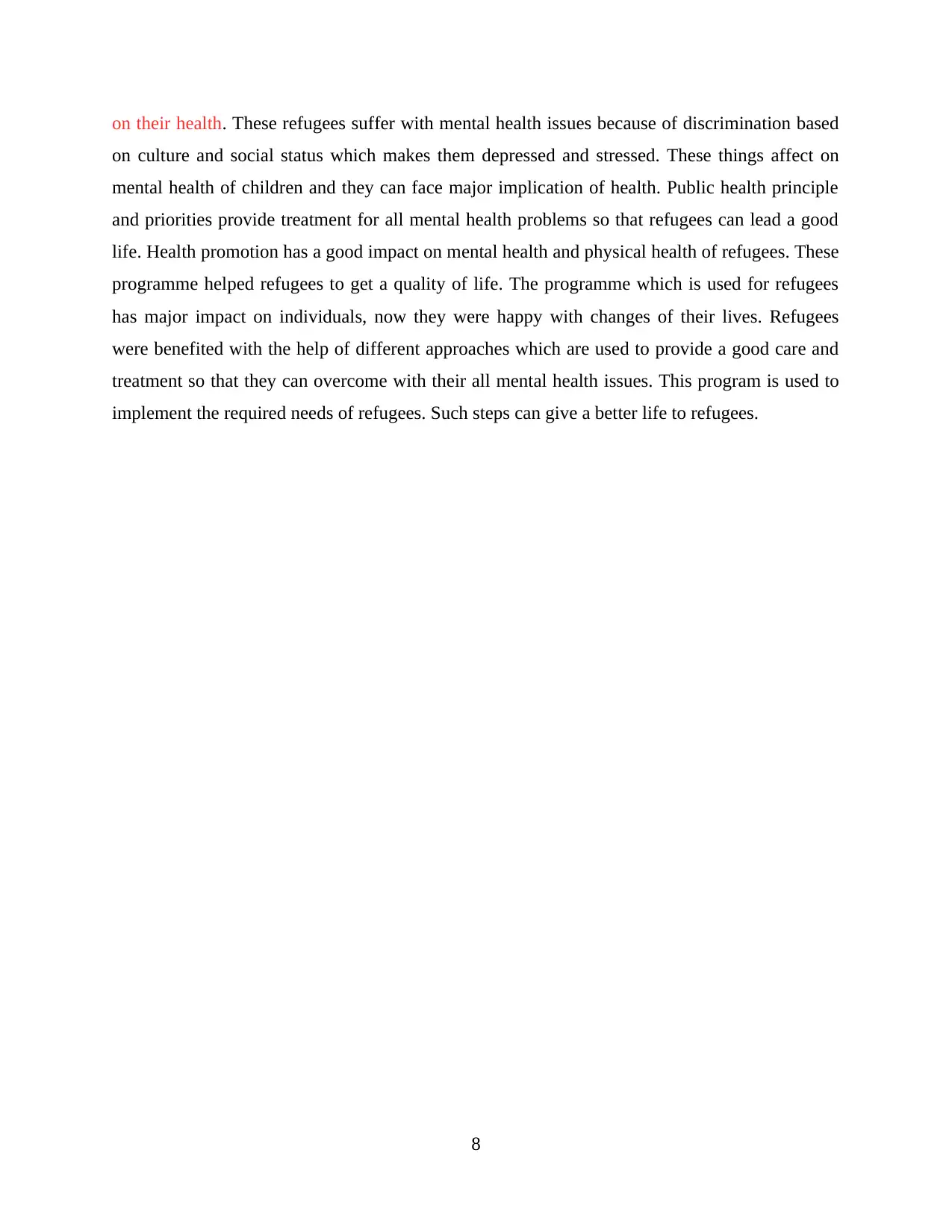
on their health. These refugees suffer with mental health issues because of discrimination based
on culture and social status which makes them depressed and stressed. These things affect on
mental health of children and they can face major implication of health. Public health principle
and priorities provide treatment for all mental health problems so that refugees can lead a good
life. Health promotion has a good impact on mental health and physical health of refugees. These
programme helped refugees to get a quality of life. The programme which is used for refugees
has major impact on individuals, now they were happy with changes of their lives. Refugees
were benefited with the help of different approaches which are used to provide a good care and
treatment so that they can overcome with their all mental health issues. This program is used to
implement the required needs of refugees. Such steps can give a better life to refugees.
8
on culture and social status which makes them depressed and stressed. These things affect on
mental health of children and they can face major implication of health. Public health principle
and priorities provide treatment for all mental health problems so that refugees can lead a good
life. Health promotion has a good impact on mental health and physical health of refugees. These
programme helped refugees to get a quality of life. The programme which is used for refugees
has major impact on individuals, now they were happy with changes of their lives. Refugees
were benefited with the help of different approaches which are used to provide a good care and
treatment so that they can overcome with their all mental health issues. This program is used to
implement the required needs of refugees. Such steps can give a better life to refugees.
8
Secure Best Marks with AI Grader
Need help grading? Try our AI Grader for instant feedback on your assignments.
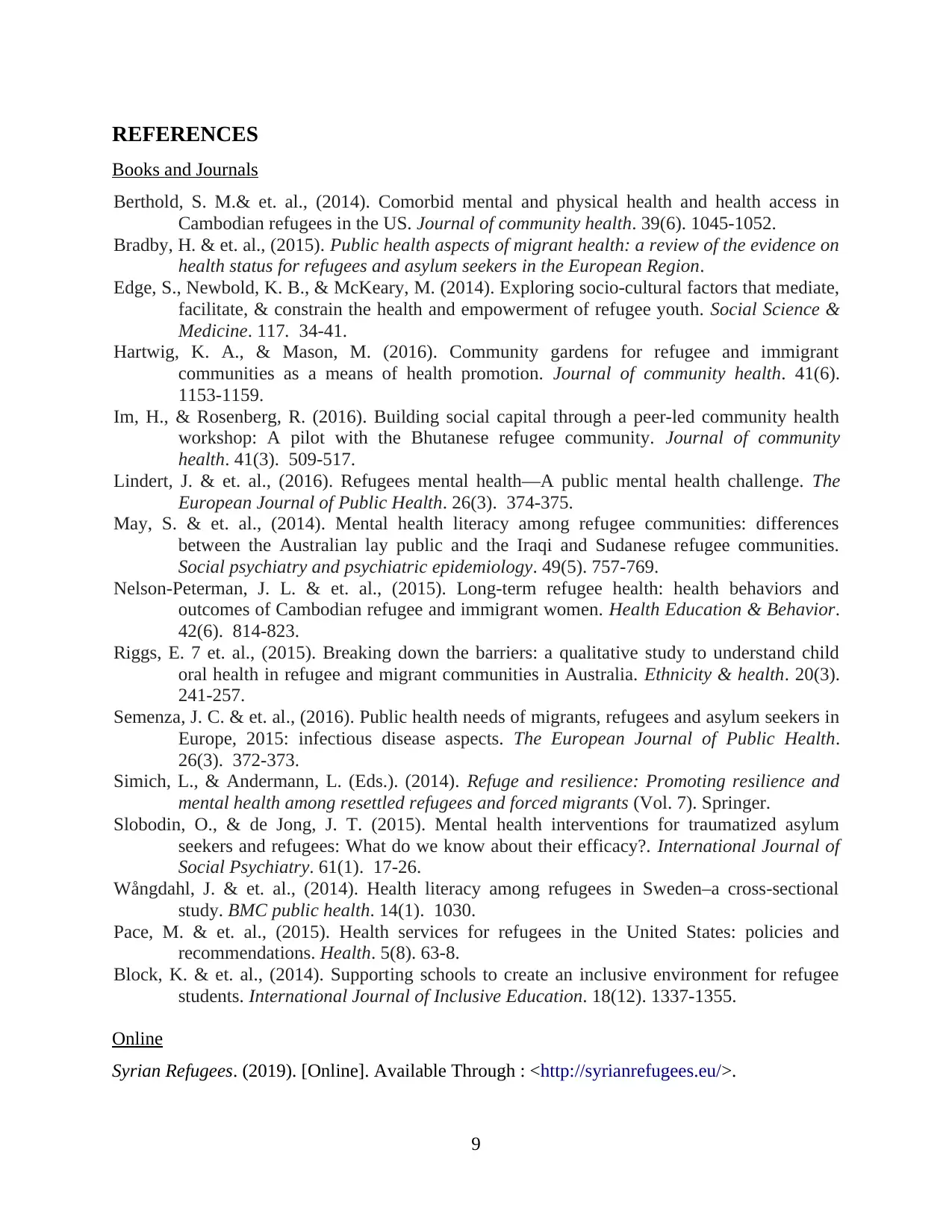
REFERENCES
Books and Journals
Berthold, S. M.& et. al., (2014). Comorbid mental and physical health and health access in
Cambodian refugees in the US. Journal of community health. 39(6). 1045-1052.
Bradby, H. & et. al., (2015). Public health aspects of migrant health: a review of the evidence on
health status for refugees and asylum seekers in the European Region.
Edge, S., Newbold, K. B., & McKeary, M. (2014). Exploring socio-cultural factors that mediate,
facilitate, & constrain the health and empowerment of refugee youth. Social Science &
Medicine. 117. 34-41.
Hartwig, K. A., & Mason, M. (2016). Community gardens for refugee and immigrant
communities as a means of health promotion. Journal of community health. 41(6).
1153-1159.
Im, H., & Rosenberg, R. (2016). Building social capital through a peer-led community health
workshop: A pilot with the Bhutanese refugee community. Journal of community
health. 41(3). 509-517.
Lindert, J. & et. al., (2016). Refugees mental health—A public mental health challenge. The
European Journal of Public Health. 26(3). 374-375.
May, S. & et. al., (2014). Mental health literacy among refugee communities: differences
between the Australian lay public and the Iraqi and Sudanese refugee communities.
Social psychiatry and psychiatric epidemiology. 49(5). 757-769.
Nelson-Peterman, J. L. & et. al., (2015). Long-term refugee health: health behaviors and
outcomes of Cambodian refugee and immigrant women. Health Education & Behavior.
42(6). 814-823.
Riggs, E. 7 et. al., (2015). Breaking down the barriers: a qualitative study to understand child
oral health in refugee and migrant communities in Australia. Ethnicity & health. 20(3).
241-257.
Semenza, J. C. & et. al., (2016). Public health needs of migrants, refugees and asylum seekers in
Europe, 2015: infectious disease aspects. The European Journal of Public Health.
26(3). 372-373.
Simich, L., & Andermann, L. (Eds.). (2014). Refuge and resilience: Promoting resilience and
mental health among resettled refugees and forced migrants (Vol. 7). Springer.
Slobodin, O., & de Jong, J. T. (2015). Mental health interventions for traumatized asylum
seekers and refugees: What do we know about their efficacy?. International Journal of
Social Psychiatry. 61(1). 17-26.
Wångdahl, J. & et. al., (2014). Health literacy among refugees in Sweden–a cross-sectional
study. BMC public health. 14(1). 1030.
Pace, M. & et. al., (2015). Health services for refugees in the United States: policies and
recommendations. Health. 5(8). 63-8.
Block, K. & et. al., (2014). Supporting schools to create an inclusive environment for refugee
students. International Journal of Inclusive Education. 18(12). 1337-1355.
Online
Syrian Refugees. (2019). [Online]. Available Through : <http://syrianrefugees.eu/>.
9
Books and Journals
Berthold, S. M.& et. al., (2014). Comorbid mental and physical health and health access in
Cambodian refugees in the US. Journal of community health. 39(6). 1045-1052.
Bradby, H. & et. al., (2015). Public health aspects of migrant health: a review of the evidence on
health status for refugees and asylum seekers in the European Region.
Edge, S., Newbold, K. B., & McKeary, M. (2014). Exploring socio-cultural factors that mediate,
facilitate, & constrain the health and empowerment of refugee youth. Social Science &
Medicine. 117. 34-41.
Hartwig, K. A., & Mason, M. (2016). Community gardens for refugee and immigrant
communities as a means of health promotion. Journal of community health. 41(6).
1153-1159.
Im, H., & Rosenberg, R. (2016). Building social capital through a peer-led community health
workshop: A pilot with the Bhutanese refugee community. Journal of community
health. 41(3). 509-517.
Lindert, J. & et. al., (2016). Refugees mental health—A public mental health challenge. The
European Journal of Public Health. 26(3). 374-375.
May, S. & et. al., (2014). Mental health literacy among refugee communities: differences
between the Australian lay public and the Iraqi and Sudanese refugee communities.
Social psychiatry and psychiatric epidemiology. 49(5). 757-769.
Nelson-Peterman, J. L. & et. al., (2015). Long-term refugee health: health behaviors and
outcomes of Cambodian refugee and immigrant women. Health Education & Behavior.
42(6). 814-823.
Riggs, E. 7 et. al., (2015). Breaking down the barriers: a qualitative study to understand child
oral health in refugee and migrant communities in Australia. Ethnicity & health. 20(3).
241-257.
Semenza, J. C. & et. al., (2016). Public health needs of migrants, refugees and asylum seekers in
Europe, 2015: infectious disease aspects. The European Journal of Public Health.
26(3). 372-373.
Simich, L., & Andermann, L. (Eds.). (2014). Refuge and resilience: Promoting resilience and
mental health among resettled refugees and forced migrants (Vol. 7). Springer.
Slobodin, O., & de Jong, J. T. (2015). Mental health interventions for traumatized asylum
seekers and refugees: What do we know about their efficacy?. International Journal of
Social Psychiatry. 61(1). 17-26.
Wångdahl, J. & et. al., (2014). Health literacy among refugees in Sweden–a cross-sectional
study. BMC public health. 14(1). 1030.
Pace, M. & et. al., (2015). Health services for refugees in the United States: policies and
recommendations. Health. 5(8). 63-8.
Block, K. & et. al., (2014). Supporting schools to create an inclusive environment for refugee
students. International Journal of Inclusive Education. 18(12). 1337-1355.
Online
Syrian Refugees. (2019). [Online]. Available Through : <http://syrianrefugees.eu/>.
9
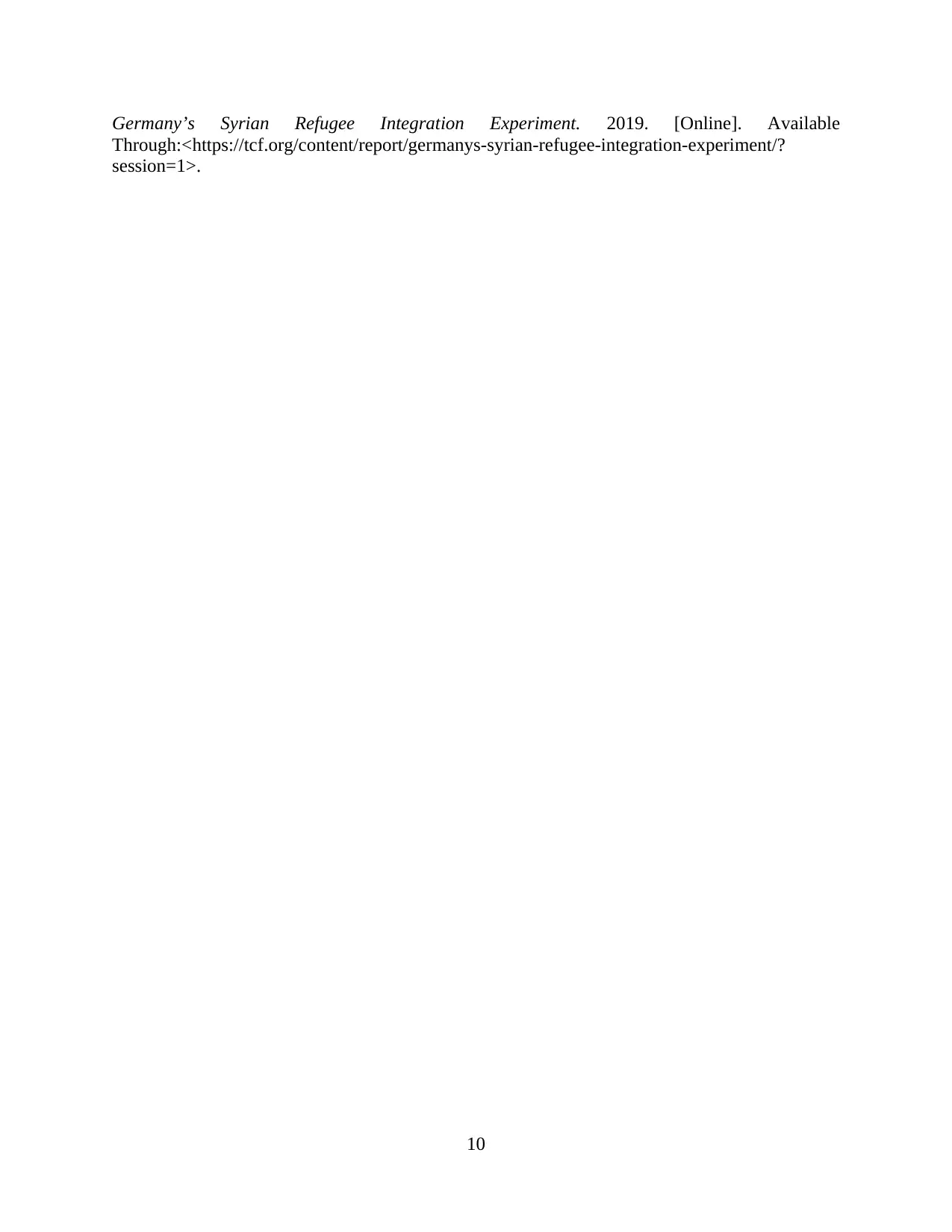
Germany’s Syrian Refugee Integration Experiment. 2019. [Online]. Available
Through:<https://tcf.org/content/report/germanys-syrian-refugee-integration-experiment/?
session=1>.
10
Through:<https://tcf.org/content/report/germanys-syrian-refugee-integration-experiment/?
session=1>.
10
1 out of 12
Related Documents
Your All-in-One AI-Powered Toolkit for Academic Success.
+13062052269
info@desklib.com
Available 24*7 on WhatsApp / Email
![[object Object]](/_next/static/media/star-bottom.7253800d.svg)
Unlock your academic potential
© 2024 | Zucol Services PVT LTD | All rights reserved.





